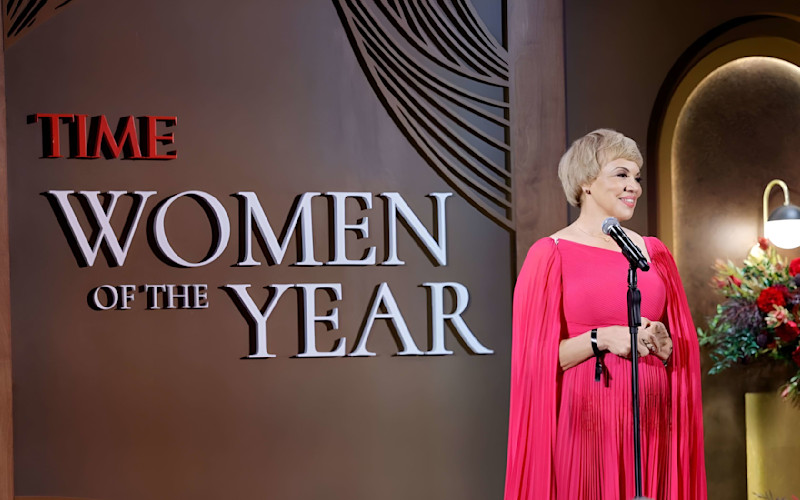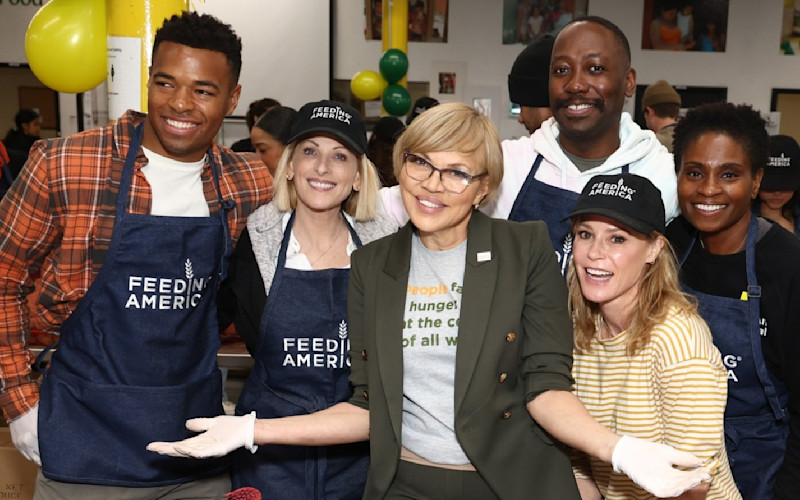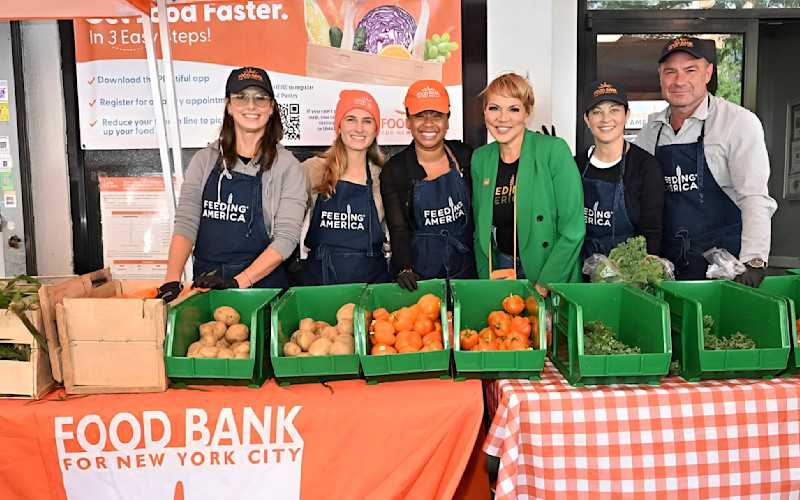From Listening to Loyalty with Feeding America’s Claire Babineaux-Fontenot

Photo Credit Feeding America | Celebrity Volunteer Support (Spring ’23) with Los Angeles Regional Food Bank alongside Feeding America CEO Claire Babineaux-Fontenot, volunteers, and celebrity supporters.
Each September, Hunger Action Month brings people across the country together to end hunger in our communities. At the center of this effort is Claire Babineaux-Fontenot, CEO of Feeding America, whose leadership has transformed awareness into nationwide action.
In a conversation with Patrick McCullough, President of Hallmark Business Connections, Claire shared how principles like listening, inclusivity, and gratitude translate into meaningful change for millions of families. She reflected on lessons from her upbringing, her belief that the people you serve should define success, and her conviction that showing appreciation is the fuel for lasting relationships.
Feeding America is the nation’s largest hunger-relief organization, uniting 200 food banks and 60,000 pantries and programs to help provide 5.9 billion meals last year. Claire has been recognized by TIME as one of its Women of the Year and by Forbes among its 50 Over 50. What stands out most, though, is not the scale of her work but her steady commitment to service, equity, and putting people first.

Claire Babineaux-Fontenot speaking onstage at the TIME Women of the Year Gala, West Hollywood, February 2025. Photo Credit Amy Sussman/Getty Images for TIME. Claire Babineaux-Fontenot speaks onstage during the TIME Women of the Year Gala at The West Hollywood EDITION on February 25, 2025, in West Hollywood, California.
Her lessons extend well beyond the nonprofit world. Whether you are leading a national organization, managing a team, or working to strengthen customer loyalty, the principles are the same: create space for every voice, let those you serve guide your true north, and make gratitude a daily practice.
Watch the full discussion with Claire below, or explore the recap below to see how her insights can guide your leadership approach.
Inclusivity as a Foundation
Claire’s leadership philosophy is rooted in her extraordinary childhood in Louisiana, where she grew up as one of 108 children. Everyone was given the chance to belong and contribute. “We didn’t decide in advance what someone’s aptitude was,” she recalls. “We gave them the ball, explained the rules, and gave everybody a chance to play.” From there, she says, “we were amazed by where people were able to excel.” That simple practice shaped her conviction that every person deserves the opportunity to show what they are capable of.
For Claire, diversity is not a buzzword. It is the foundation for resilience and a driver of success. “There’s a direct correlation between encouraging diversity and winning,” she says.
As the leader of a national organization, she carries those lessons forward. Feeding America’s success does not rest on a single strategy or leader, but on the lived experiences of the people it serves and the communities it partners with. This is not just a professional philosophy; it is a personal commitment shaped by a life dedicated to embracing humanity in all its forms.
For today’s leaders, the takeaway is clear: organizations grow stronger when they widen the circle. Making room for every voice is not only the right thing to do, it is how you unlock innovation, deepen trust, and set the stage for loyalty that lasts. That belief in equity shaped how Claire would later define what success truly means.
Defining Your True North
When Claire became CEO of Feeding America, she often heard a refrain: “We work for the food banks.” She quickly reframed it. “We, and they, work for people experiencing hunger.”
That clarity became her true north. “One of the most important things that we’ve done together and I’ve helped to lead,” she explained, “is to make a clear determination about who the arbiter of success is. To know them is your true north. The thing that keeps you focused, the thing that keeps you motivated.”
That perspective proved vital when the pandemic hit just two years into her tenure. As demand surged to unprecedented levels, Claire and her team kept their attention fixed on what mattered most: ensuring that people in need of food received it.
Claire emphasizes the importance of listening to the communities Feeding America serves. Through the organization’s Network Strategic Framework, her team brought together food banks, pantries, and most importantly, neighbors experiencing hunger to shape the path forward.
One moment still resonates with her.
During a session on technology priorities, the focus was on data systems and supply chain improvements. In the middle of that discussion, a neighbor raised a simple but profound question: “Where on your list then is telling me where I can get food?” The room fell quiet. That one question reframed priorities: strategy only matters if it meets people’s most immediate needs.
For leaders in any field, the real measure of success is found in the people whose lives you touch. When you listen deeply and invite those voices to shape your direction, you create strategies that strengthen trust, deepen connection, and endure over time.

Respect, Not Rescue
For Claire, respect is at the heart of service. She puts it simply: “People want to feel respected, not rescued.”
It’s a truth she knows firsthand. As a law student, she once found herself without money for groceries or gas. “That didn’t mean my brain didn’t work,” she explained. “It meant that at that moment, I needed some food.”
That perspective continues to guide Feeding America’s communications. Instead of deficit-based portrayals, the organization highlights dignity and resilience. “We were told you’ll never raise money unless you show ‘sad eyes,’” Claire recalled. “But we’ve proved that wrong. People give when they see bright eyes, bright futures, and bright aspirations. Do I want to be defined by what I don’t have, or by my aspirations, strengths, and what I do have? We believe the latter is true for most, if not all, people.”
This approach, known as asset framing, flips the traditional narrative of philanthropy. Instead of showcasing scarcity, it positions those served as capable, resilient, and hopeful. For donors and volunteers, this fosters respect, not pity, and it is that respect which drives long-term loyalty and engagement.

Claire Babineaux-Fontenot, Feeding America CEO, with volunteers and celebrity supporters at Los Angeles Regional Food Bank during Hunger Action Month. Photo Credit Feeding America | Celebrity Volunteer Support (Spring ’23) with Los Angeles Regional Food Bank alongside Feeding America CEO Claire Babineaux-Fontenot, volunteers, and celebrity supporters.
Storytelling Over Statistics
Claire believes that while numbers can inform, stories are what connect: “Real human beings can get lost in big numbers. People and their real stories break through. People break through in eaches better than in bundles.”

One Feeding America campaign highlights a young boy who loves robotics. Instead of presenting him as “a child in need,” he is shown as a future scientist, full of curiosity and potential. “The act of being himself is so powerful,” Claire explained. That story traveled further and resonated deeper than any chart or graph could.
“Our investors in communities will engage others in stories about people; individuals, not grandiose stats,” she adds.
Patrick McCullough observed that both Feeding America and Hallmark share this commitment to storytelling and human connection. Claire replied with warmth: “I don’t know an organization that’s better at capturing moments and telling stories and communicating the hearts of people than Hallmark is. So I am flattered by the association.”
The lesson for leaders is universal. Data can measure progress, but stories build connection. Share one volunteer’s impact, one customer’s experience, or one employee’s journey. Stories like these move people to act.

Gratitude as Kinetic Fuel
When asked about donor and volunteer engagement, Claire is unequivocal: “Gratitude is essential. It’s a key driver.”
For Feeding America CEO Claire Babineaux-Fontenot, gratitude is not optional. It is the very fuel that sustains relationships. Donors, she explains, are not just supporters; they are investors in communities. Treating them that way means recognizing not just what they give, but why they give and showing them the tangible impact of their generosity.
This philosophy extends to every corner of Feeding America’s network. Volunteers who sort food, staff members working long hours, and partners who contribute expertise. All are part of the mission. Expressing appreciation authentically and often is what transforms a single act of giving into a lasting bond.
Claire sees gratitude as a leadership imperative inside the organization. With nonprofit turnover rates around 15%, she points out that appreciation builds resilience and retention in high-demand environments. “Gratitude is an essential ingredient in the work that we do,” she said. “It’s how people know they are seen.”
In practice, this means embedding gratitude into the culture, not leaving it to chance. Whether through personal acknowledgments, traditions that mark milestones, or rituals that bring people together, Claire emphasizes that appreciation must be part of the organizational fabric. When people feel valued, they stay. When they feel seen, they contribute more. And when they feel their role truly matters, they become advocates for life.
Hallmark has seen the same truth play out across our work with clients: when gratitude becomes part of your culture, loyalty follows.
A Personal Practice of Gratitude and Hallmark Tradition
Each year, Claire hosts a tree-trimming party where friends bring ornaments that represent their connection to her. Over time, this has grown into what she calls her “friendship tree,” a living collection of gratitude and shared memory.
She has carried this tradition into her role at Feeding America. One holiday season, she gifted colleagues Hallmark ornaments featuring an artist’s palette. “It was a symbol of the beautiful opportunity to build a masterpiece together,” she said.
For Claire, gratitude is about expressions that endure. That same spirit runs through the Hallmark brand. For more than a century, Hallmark products have been a shared language of memory and meaning, carrying emotions across seasons and generations. At Hallmark Business Connections, we’re proud to extend that tradition into the professional world, helping organizations honor milestones, convey appreciation, and build connections that last.

Feeding America CEO Claire Babineaux-Fontenot with actor Liev Schreiber during Hunger Action Day event. Photo Credit Liev Schreiber | Hunger Action Day with Feeding America CEO Claire Babineaux-Fonteno and Liev Schreiber.
Loyalty that Lasts
Claire’s lessons form a simple but powerful guide: widen the circle so every voice is heard, let those you serve define success, tell stories that empower and evoke emotion, and keep gratitude at the center.
These practices do more than inspire goodwill. They build loyalty that carries organizations through challenges and sustains them over time. And in today’s environment, loyalty matters more than ever. In 2025, nonprofit leaders are prioritizing donor retention over acquisition, with research showing it costs five times more to acquire a new donor than to keep an existing one.
The same is true for businesses: loyalty is built through trust, respect, and connection. Leaders who embed those values daily create long-term impact and sustainable growth.
Hallmark Business Connections
At Hallmark Business Connections, we see these same principles at work every day. We partner with thousands of organizations to bring Hallmark moments into the business world—building stronger relationships and connecting in more personal, emotional ways.
Claire Babineaux-Fontenot’s leadership reminds us that lasting relationships are built when we go beyond the expected: when we tell stories that resonate, show appreciation with intention and specificity, and create space where everyone feels they belong.
Key Takeaways for Leaders
Lead with listening. Begin with the voices of those you serve. For businesses, this means co-creating solutions with customers and employees rather than making assumptions.
Measure what matters. Success isn’t only output and efficiency. Build measures of dignity, trust, and belonging into your scorecard.
Operationalize gratitude. Appreciation should be embedded into how your organization operates. When gratitude becomes a practice, loyalty follows.
Equip your storytellers. A single story can do more to inspire action than a list of statistics. Give employees, donors, or customers stories they can carry into conversations with others.
Adopt an abundance mindset. Scarcity mindsets limit growth. Believing in abundance, in talent, ideas, and potential, opens space for innovation, resilience, and deeper relationships.
Take Action
September is Hunger Action Month, led by Claire and her team at Feeding America.
Learn how you can take action in your community alongside Feeding America.
Show your appreciation for volunteers and donors with Hallmark Business Connections.

About Claire Babineaux-Fontenot:
Claire Babineaux-Fontenot is a leader and advocate dedicated to combating hunger and strengthening communities. Her decades-long service in social justice and humanitarian efforts is emblematic of her unwavering commitment to working alongside people experiencing food insecurity to create sustainable, equitable solutions in the movement to end hunger. Since 2018, Claire has served as the Chief Executive Officer of Feeding America, a network of food banks, statewide food bank associations, food pantries, and meal programs, and the largest charity in the United States since 2022, according to Forbes. Prior to joining Feeding America, Claire has been entrusted to lead effective teams for three decades, including 13 years on Walmart's leadership team, most recently as executive vice president and global treasure where she had global responsibility for tax, treasury operations, capital markets, investor relations, global risk management, casualty, and self-insurance, leading teams across 28 countries and over 1,000 associates worldwide.
A Louisiana native, Claire holds a Bachelor of Science from the University of Louisiana in Lafayette, a Juris Doctor from Southern University Law Center in Baton Rouge, Louisiana, and a Master of Laws in Taxation from Southern Methodist University Dedman School of Law in Dallas, Texas. Claire was named one of Time's 100 most influential people of 2020. In 2021, she was honored with PRWeek’s Communicator of the Year award and Southern Methodist University’s Distinguished Alumni Award. Claire was among Forbes' 50 over 50 in 2022, the 2023 American Association of State Colleges and Universities Distinguished Alumnus, and in 2024, she was honored with the Laetare Medal from the University of Notre Dame. Her relentless pursuit of an equitable, hunger-free America exemplifies her as a trailblazer and a compassionate advocate for social justice.

These insights are part of our Conversations on Connection series, leadership conversations that explore how care, gratitude, and authenticity drive stronger relationships. Follow along for more perspectives and practical ways to build relationships that last.
In this Article
-
Inclusivity as a Foundation
-
Defining Your True North
-
Respect, Not Rescue
-
Storytelling Over Statistics
-
Gratitude as Kinetic Fuel
-
Loyalty that Lasts
-
Hallmark Business Connections
-
Key Takeaways for Leaders
-
Take Action
Products
Similar Articles

Leading Boldly Through Change With Katarina Berg
Dec 19, 2025
The Heart of the Hustle with Claude Silver
Nov 04, 2025




